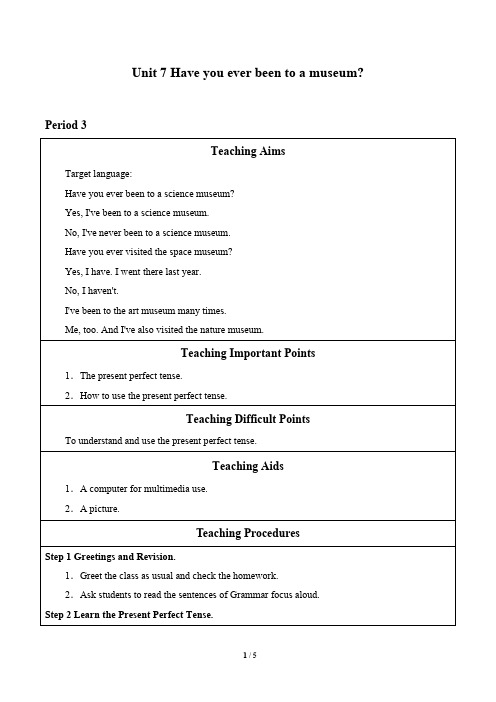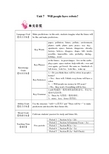初中英语八年级上册Unit 7 Period 3
八年级上册英语第七单元知识点

八年级上册英语第七单元知识点八年级上册英语第七单元的知识点主要包括以下内容(具体内容可能因不同版本的教材而有所差异):
一、词汇
学习并掌握本单元的新单词、短语及其用法,如有关描述人物特征、个性、习惯等方面的词汇。
二、语法
1. 比较级和最高级:本单元可能会重点讲解形容词和副词的比较级和最高级的构成及用法,包括规则变化和不规则变化。
2. 一般现在时:复习和巩固一般现在时的用法,特别是第三人称单数的动词变化。
3. 情态动词:可能会涉及情态动词如should, could, might等的用法。
三、句型
1. 学习并掌握本单元的重点句型,特别是与人物描述、比较、建议等相关的句型。
2. 掌握如何用英语描述人的外貌、性格、能力等。
四、阅读
通过阅读本单元的课文,提高阅读理解能力,学习如何获取文章中的关键信息,并理解文章的主旨大意。
五、写作
学习如何用英语写一篇描述人物的文章,包括描述人物的外貌、性格、爱好、习惯等方面。
六、听力和口语
通过听力和口语练习,提高听懂和用英语描述人物的能力,包括听懂有关人物描述的对话和短文,以及能够用英语进行简单的人物描述。
请注意,以上只是可能的知识点概述,具体的学习内容应以您所使用的教材为准。
建议您参考教材、教辅资料或咨询教师以获取更详细和准确的信息。
Unit+7+Section+A+Grammar-3c 人教版英语八年级上册

Will people have robots in their homes? Yes , they will .\No , they won’t .
特殊疑问句:_特__殊__疑_问__词__+一般疑问句? What will you do tonight? 一般将来时常与表示将来的时间状语连用,如___in__t_e__n__y_e_a_r__s_, ____n_e_x_t__w__e_e_k____,___t_o__m_o__r_r_o_w_____等。
1. In the future, there will be l_e_s_s_ fresh
because there will be
_m__o_r_e
in the sea.
2. In 100 years, there will be _m__o_r_e_
because there will be _m__o_r_e_
We are leaving for Shanghai tomorrow. 明天我们将动身去上海。
Presentation
Countable nouns
Uncountable nouns
There will be more people. There will be more pollution. There will be fewer trees. There will be less free time.
People will have robots in their homes.
一 否定句:在will 的后面加___no_t_即可。 will not = won’t
People will not (=won’t) have robots in their homes.
2018年秋八年级英语上册-Module-7-Unit-3-Language-in-use课件2-(

6. While Masha _w__a_s_c_o_o_k_i_n_g___(cook) dinner, the bell ___ra_n__g__ (ring).
Stories
Stories In the past, not many people could read or write, so people listened to stories. Some stories were popular, and they changed every time someone told them. The stories passed from generation to generation. Finally, someone wrote them down.
She was also in the car and on the back seat, there were some bags of clothes and some food. My father was driving out of the town. “Where are we going?” I asked. It was a warm evening and lots of people were walking along the road. It was the last day of term.
Writing a short story about your own experience
Make notes about your story. Think about: • when it happened • what you were doing at the time • what happened first • what happened next • what happened finally
鲁教版(五四学制)英语八年级上册:Unit 7 Have you ever been to a museum. 教案3

Unit 7 Have you ever been to a museum? Period 3e.g.: Have you ever been to Hong Kong?你曾去过香港吗?I haven't ever spoken to her.我未曾和她说过话。
never意为“从来没有”常与before连用,多放在助动词与过去分词之间。
e.g.: I have never travelled by plane before. 我以前从来没有乘飞机旅行过。
3.have been to & have gone to区别。
比较:He has been to Beijing.他曾去过北京。
(人已回来,可能在这儿。
)He has gone to Beijing.他已经去北京了。
(人已走,不在这儿了。
)(1)have / has been (to) 表示“曾经到过某地”,说话时此人不在那里,已经回来。
侧重指经历。
(2)have / has gone (to) 表示某人“已经去某地了”,说话时此人可能在路上或已到那里,反正不在这里。
4.一般过去时与现在完成时的区别。
比较:I have seen the film.我看过这部电影。
(我了解这部电影的内容。
)I saw the film last month.我上个月看了这部电影。
(只说明上星期看了这部电影,不涉及现在情况。
)(1)一般过去时只强调过去的动作;现在完成时强调过去的事情对现在的影响。
(2)一般过去时通常与表示过去的时间状语连用;现在完成时则不能与表示过去的时间状语连用。
(3)一般过去时单纯表示过去的经历;现在完成时表示过去的动作或状态延续到现在并可能持续下去。
一般过去时的时间状语有:yesterday, last week, ago, in1980, in October, just now…共同的时间状语有:this morning, tonight, this summer, before, already现在完成时的时间状语有:for, since, ever, never, just, already, yet, in past years Step 3 Exercises.Finish exercises.1.根据括号内的要求完成下列各句,每空一词(含缩写)。
新版外研社英语八年级上module7unit3

about, C? C: At eight o’clock last night I was having dinner.
How about you, D? D: …
4 Write down what each member of
1 Underline the correct words.
1 Suddenly, all the lights in my house were going off / went off. There was heavy rain outside.
3 — I called you up at seven o’clock last night, but nobody answered it. — Really? I’m sorry, but I was teaching / taught a piano lesson at school.
_la_s_t_n_i_g_h_t_. __ 4_I_w_a_s__c_h_e_ck__in_g__m_y__e_m_a_i_l_a_t_e_i_g_h_t_o_’_c_lo_c_k__la_s_t_n_i_g_h_t.
5 Complete the sentences with the correct form of the expressions in the box.
Paragraph 3 7 I found some biscuits in my pocket and gave it to
the cat. 8 Soon, it was eating biscuits and smiling at us.
Unit+7+Section+A+Grammar+Focus-3c 人教版英语八年级上册

Unit 7
Will people have robots?
Section A 2d-3c
Learning goals
Words & phrases:
peace,sea,sky,world peace,the same as, in the future
Sentences:
1. What will the future be like? 2. Will there be world peace?
2. In 100 years, there will be _m_o_r_e___ cars because there will be __m__o_r_e_ people in the cities.
3. There will be f_e_w_e_r__ jobs for people because _m_o_r_e____ robots will do the same jobs as people.
My future is not a dream! I will be…
Where there is a will, there is a way.
3c Draw a picture of what you think a city in the future will be like. Then describe it to the class.
I think there will be more tall buildings, and there will be fewer cars and more buses.
1) I earn _l_e_s_s_ money than my sister. 2) There are _fe_w__e_r_cars parked outside than yesterday. 3) We have _fe_w__e_r_students this year than last year. 4) You ought to smokef_e_w_e_r_cigarettes and drink
译林版八年级上册英语 UNIT7 Period 3 Reading Ⅱ

iver.
A. untilB. asC. beforeD. if
【点拨】考查连词。句意为“这些学生当他们沿着小 河走的时候, 唱着歌”。until直到……为止; as随着, 当……时; before在……之前; if如果。故选B。
9.—Wouldyoulikesomecoffee? —No, thanks. I________drinkcoffee.
Farmersarebusyharvestingallkindsoffreshfruits.
16. 一阵风把落叶卷成(herd)堆。 _____A__w_in__d_h_e_r_d_e_d_th__ef_a_l_le_n_l_e_a_v_e_si_n_t_o_p_il_e_s_. ______17. 松鼠喜欢在树洞里躲避寒冷。
Itiscozytospendalazyafternoononabeach 18 insummer.
19 Heknockedmycupontotheflooranditfellintopieces. Inwinter, thetemperatureinthisareaoftendrops
20 belowzero.
Heknockedmycupontotheflooranditfellintopieces.
20. 冬天,这个地方的温度经常降到零度以下。 _____I_n_w__in_t_e_r_, _______________________________ _____t_h_e_t_e_m_p_e_r_a_t_u_r_e_in_t_h_i_s_a_re_a_o_f_t_e_n_d_r_o_p_sb__elowz
【点拨】考查介词。在具体的某一天的上、下午前用 on不用in, 比如星期、天气等都属于具体的情况, 句 中asnowymorning属于用天气修饰的早晨, 故选B。
【人教版】新目标2020年八年级英语上册Unit7单元教案

Unit 7Will people have robots?本单元围绕“谈论未来”及“提出问题”这两个话题,设计了相关的活动,从听、说、读、写四个方面,帮助学生掌握运用本单元的重点语法“一般将来时表示猜测”的用法,对学生三种时态的运用能力进行综合训练,帮助学生形成创造性地运用所学三种时态的能力。
第一课时Section A(1a-2d)Teaching Goals【教学目标】Key words:paper,pollution,prediction,future,pollute,environment,planet,earth,plant,partKey phrases:make predictions,live to be 200 years old,in 100 years,free time,on computers,go to school,in great danger,live on the earth,play a part in Key sentences:1. Will people use money in 100 years?2. People will live to be 200 years old.3. There will be fewer trees and the environment will be in great danger.Teaching Key Points【教学重点】The vocabulary:paper,future,pollute,pollution,environment,part,in 100 years,in great danger,play a part inTarget language:Will people use money in 100 years?No,they won't. Everything will be free. Will people live to be 200 years old?Yes,they will. What's your prediction about the future?I think there will be more pollution.Teaching Difficult Points【教学难点】1.will构成一般将来时态的句式。
